| Euphorbia prostrata | |
|---|---|
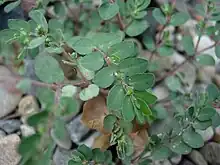 | |
| Scientific classification | |
| Kingdom: | Plantae |
| Clade: | Tracheophytes |
| Clade: | Angiosperms |
| Clade: | Eudicots |
| Clade: | Rosids |
| Order: | Malpighiales |
| Family: | Euphorbiaceae |
| Genus: | Euphorbia |
| Species: | E. prostrata |
| Binomial name | |
| Euphorbia prostrata | |
| Synonyms[1] | |
| |
Euphorbia prostrata is a species of spurge known by the common name prostrate spurge or prostrate sandmat.
It is native to the Caribbean and certain parts of South America. It is widely naturalized in many other parts of the world, where it can be found in varied habitat types and in many areas grows as a roadside weed.
Description
Euphorbia prostrata is an annual herb producing slender prostrate stems up to approximately 20 centimetres (7.9 in) long, sometimes purple-tinted in color.[2] The oval-shaped leaves are up to one centimetre (0.39 in) long with finely toothed edges.
The inflorescence is a cyathium less than two millimetres (0.079 in) wide, with white petal-like appendages surrounding the actual flowers. There are four male flowers and a single female flower, the latter developing into a lobed, hairy fruit one to two millimetres (0.039 to 0.079 in) wide.
E. prostrata is similar to both Euphorbia maculata and Euphorbia serpens, but is often hairy on the leaves and stems, while the latter two species are often smooth. It differs from E. maculata by its less elongated and less lanceolate leaves. E. serpens by contrast has much more rounded leaves than E. prostrata with relatively larger and more conspicuous flowers. The flowers of E. prostrata do not typically show the white "petals" seen in E. serpens or E. maculata and thus flowers are hard to detect in the former species. Only E. maculata shows dark spots in the center of each leaf, but this is not always present in that species.
Medicinal use
Euphorbia prostrata extract has been found effective for treatment of bleeding hemorrhoids due to its contents of flavonoids, phenolics and phenolic acids.[3] Euphorbia prostrata extract tablets have been marketed in India and the US by Panacea Biotec Ltd.
Gallery
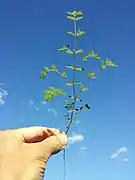 Uprooted plant
Uprooted plant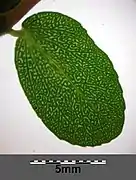 Leaf with transmitted light
Leaf with transmitted light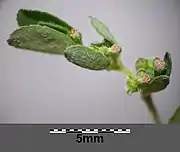 Inflorescence
Inflorescence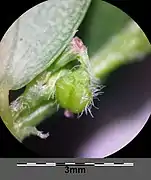 Fruit
Fruit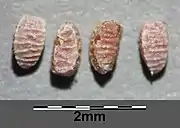 Seeds
Seeds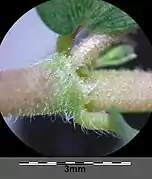 Stem with stipules
Stem with stipules
References
- ↑ "Euphorbia prostrata Aiton". Plants of the World Online. Royal Botantical Gardens. n.d. Retrieved August 17, 2022.
- ↑ Aluka Profile
- ↑ Bakhshi, Girish D.; Langade, Deepak G.; Desai, Vidyadhar S. (2008). "Prospective, Open Label Study of Euphorbia Prostrata Extract 100 mg in the Treatment of Bleeding Haemorrhoids" (PDF). Bombay Hospital Journal. 50 (4): 577–583. Archived from the original (PDF) on March 6, 2012. Retrieved July 31, 2015.
- Planta Medica 50:138, Research Paper:Authors MS Akhtar,QM Khan and T Kaliq: Effects of EUPHORBIA PROSTRATA along with FUMARIA PARVIFLORA in noemoglycaemic and alloxan treated hyper glycaemic rabbits as quoted in the book MAJOR HERBS OF AURVEDA: Edited by Elizabeth M Williamson and compiled by Dabur Research Foundation-Page 150-153.
External links
 Media related to Euphorbia prostrata at Wikimedia Commons
Media related to Euphorbia prostrata at Wikimedia Commons- Jepson Manual Treatment
- USDA Plants Profile
- Photo gallery